It’s the most wonderful time of the year — time for the World Juniors!
This tournament is always captivating for Canadians and hockey fans around the world, showcasing the NHL’s future stars over two weeks during the holidays.
From a scouting perspective, the 2020 tourney features a record-setting number of draft-eligible prospects, including most of the projected top-10 picks. They will be sharing the ice with several first-rounders from the past two drafts (2018 and 2019), ensuring this will be an event to remember and potentially one for the ages.
Beginning today in the Czech Republic, here are 10 things to watch at the 2020 World Junior Championship.
Draft Eligible Talent
Seven of my top 10 prospects will be on display, including Alexis Lafreniere (1), Quinton Byfield (3) and Jamie Drysdale (7) for Canada, Lucas Raymond (2) and Alexander Holtz (8) for Sweden, Yaroslav Askarov (4) in goal for Russia, and Tim Stutzle (5) in a starring role for Germany. That total would have been eight, but an injury prevented Anton Lundell (6) from representing Finland again.
Lafreniere is still the consensus top prospect for 2020, with Byfield considered his closest competitor ahead of Raymond and the others heading into this tournament.
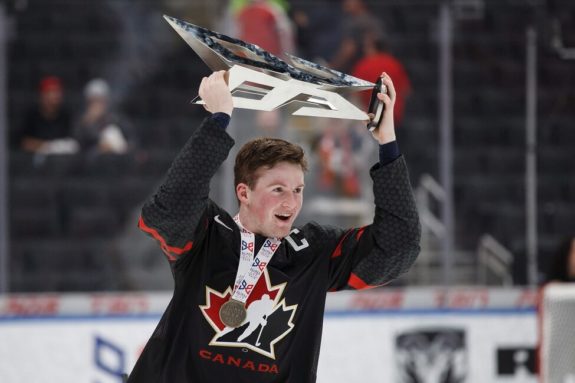
Those are the biggest names, but here are some more draft eligibles of note: Czech forwards Jan Mysak (19), Jaromir Pytlik (34) and Adam Raska (63); German forwards John-Jason Peterka (36) and Lukas Reichel (37); Slovakian defencemen Samuel Knazko (59) and Marko Stacha (134); plus another trio of forwards in Canada’s Dawson Mercer (23), Russia’s Maxim Groshev (97) and Switzerland’s Simon Knak (104).
That accounts for 17 of the approximately 30 first-time draft eligibles, with the overall total lowered by some surprising cuts as the rosters were finalized, including Slovakian forward Martin Chromiak (35) and German defenceman Maximilian Glotzl (133).
For those wondering, the numbers in parenthesis are from my December rankings.
Worth mentioning, there will also be draft-eligible overagers — prospects passed over in previous drafts — competing in this year’s tournament as per usual, including goaltenders Nico Daws for Canada and Samuel Hlavaj for Slovakia as well as American forward Parker Ford. Russia has Amir Miftakhov in net, Danila Galenyuk on defence, and Egor Sokolov and Nikita Rtishchev up front, while Finland has a few intriguing forwards in Kristian Tanus, Joonas Oden and Eemil Erholtz.
There won’t be many underagers at this year’s tournament, but Finland has the most notable one in forward Aatu Raty, who is the early favourite for first overall in 2021.
Elite Goaltending
Goaltending always becomes a big storyline in these short international tournaments, but it is a talking point from the outset this year because of a couple special prospects backstopping their countries.
Spencer Knight is the starter for the United States, while the aforementioned Askarov will be sharing the Russian crease with Miftakhov. Knight was selected 13th overall in 2019 by the Florida Panthers and Askarov is expected to go even higher in 2020. Both are potential superstars at their position, with Askarov drawing comparisons to Carey Price and Andrei Vasilevskiy, while Knight could be better than John Gibson and Jonathan Quick.
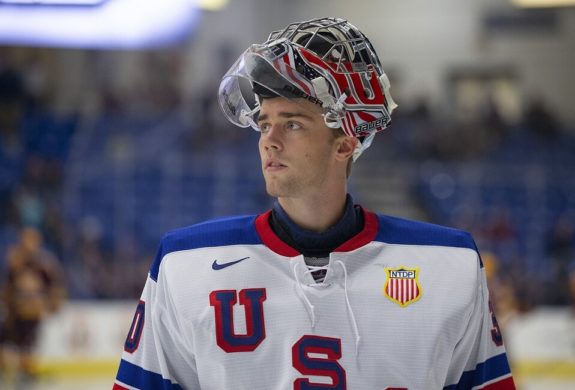
Jesper Wallstedt didn’t make the cut for Sweden, but he is also generating plenty of hype as the top goalie for 2021, though not quite on the same level as Askarov and Knight.
Sweden is going with Hugo Alnefelt (Tampa Bay), while the Czechs have Lukas Dostal (Anaheim) and Finland has Justus Annunen (Colorado) as their already drafted starters. Those three could challenge Knight for the tournament’s top goaltender award, with Askarov also having a chance if he beats out Miftakhov for the bulk of Russia’s duty.
Daws is expected to start for Canada ahead of St. Louis draft pick Joel Hofer, Hlavaj should be the guy for the Slovaks, Switzerland will likely lean on returnee Luca Hollenstein, and Germany’s Hendrik Hane might also be capable of stealing a game.
Overall, the goaltending should be stellar this year, which could mean more lower-scoring games than usual.
Canada’s Top Six
Canada’s top two forward lines are going to be lethal. Consider them 1A and 1B, with Lafreniere flanking Joe Veleno alongside Nolan Foote, while Byfield and Dylan Cozens shift to the wings with captain Barrett Hayton. Veleno is playing pro in the AHL and Hayton is on loan from the NHL. All six will share the distinction of being first-round NHL draft picks.
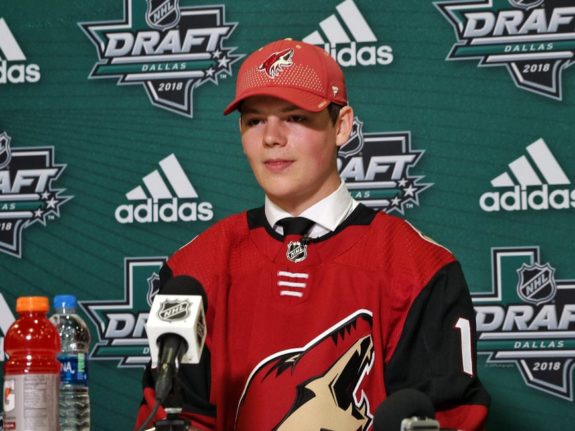
Canada is deep up front, as always — so deep they could have sent a second team — but those top-six forwards will carry the offence. Hayton’s line is heavy and will be hard to contain, while Lafreniere’s line has a little bit of everything and can attack in different ways. There may be no stopping either of those trios and they might be equally potent as the tournament progresses.
American Snipers
As goal-scorers go, the United States boasts three of the best snipers in Cole Caufield, Oliver Wahlstrom and Arthur Kaliyev. That trio of wingers should fill the net for the Americans.
The second wave includes Nick Robertson, Shane Pinto, Alex Turcotte, Trevor Zegras and Bobby Brink. Those eight forwards are going to produce a ton of offence over three lines at even strength and the two power-play units. It’s a young group but, no matter how good the goalies are this year, good luck stopping them!
Sweden’s Stacked Defence
Sweden’s key to success will be their defence, with five first-rounders on the roster — two of whom already have NHL experience. Those being Rasmus Sandin (Toronto) and Tobias Bjornfot (Los Angeles), with Victor Soderstrom (Arizona), Philip Broberg (Edmonton) and Nils Lundkvist (New York Rangers) as the other three.
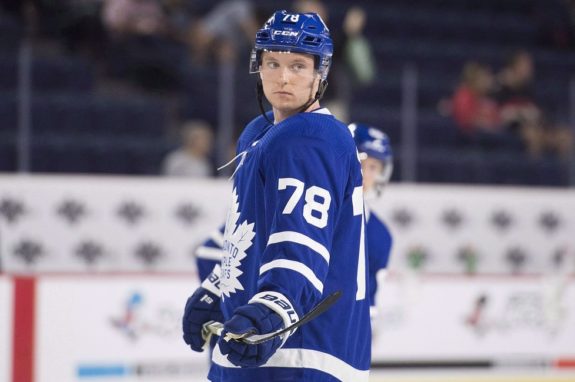
Rounding out the impressive blue line is captain Adam Ginning, a Philadelphia second-rounder, and Mattias Norlinder, a Montreal third-rounder. Together, those seven will form the strength of Sweden’s team.
The question is, who quarterbacks that power play? No shortage of options there and yet they are all effective at both ends, with Ginning more of a shutdown type. The ideal quarterback would have been Adam Boqvist, who wasn’t loaned by Chicago after the Blackhawks made the same decision with Canadian forward Kirby Dach.
Finland’s Quest to Repeat
Finland enters as the defending champion from last year’s tournament in Vancouver but won’t be the betting favourite to repeat.
The Finns will be without two of their top forwards in Kaapo Kakko, who wasn’t expected to be loaned by the Rangers as the second overall pick after scoring the golden goal in 2019, and Lundell, who has been sidelined since November and wasn’t able to recover in time for the World Juniors. Lundell helped set up Kakko’s winner in the gold-medal game against the United States as an underager at the 2019 tournament.
Without them, Finland will also rely on their defence — led by first-rounders Ville Heinola (Winnipeg), who got into eight NHL and three AHL games before returning to the Finnish Liiga, and Lassi Thomson (Ottawa), who will captain Finland for this tournament.
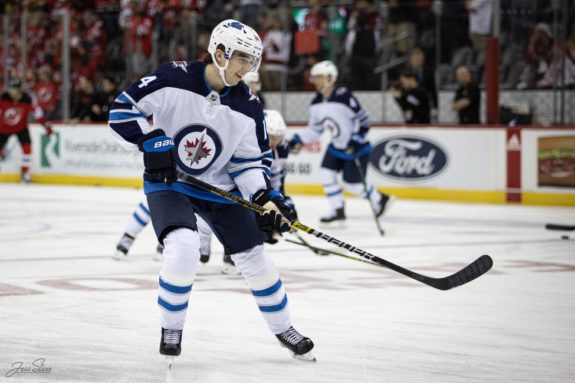
Finland’s forwards are still arguably better than Sweden’s group, with Rasmus Kupari on loan from the AHL as the lone returnee up front. He’ll need to be a catalyst for Finland, complemented by Matias Maccelli, Patrik Puistola, Sampo Ranta, and the Raty brothers — Aatu and the less-heralded elder Aku.
As long as Annunen is solid in goal — which should be the case — Finland will be a tough out in defending their title.
Russia’s Resurgence
Don’t sleep on Russia as a medal contender despite getting drawn into a difficult group with Canada and the United States. It seems like the Russians are being underrated — and almost written off — by many pundits and prognosticators, but their roster shouldn’t be underestimated.
There is a ton of talent on this Russian team, led by the emerging top line of Vasily Podkolzin, Kirill Marchenko and Ivan Morozov. Grigori Denisenko, who is playing with Pavel Dorofeyev and Alexander Khovanov, is back as Russia’s best forward after starring at last year’s tournament. That top six will be able to hang with their Canadian and American counterparts.
Russia’s defence is presumably the underrated position. Alexander Romanov is the stud that everybody knows, but look for Colorado draft pick Daniil Zhuravlyov to make a name for himself in this tournament. Egor Zamula, Daniil Misyul and the aforementioned Galenyuk could open a lot of eyes too. Those aren’t household names — at least not yet, not even among prospect junkies — but they are all quality defenders with offensive capabilities.
Valeri Bragin’s biggest decision will be in goal — and he tends to make peculiar decisions at that position — but, regardless of who is between the pipes, Russia needs to be taken seriously.
Germany’s Return
The most intriguing team in this year’s tournament has to be Germany. Also drawn into that daunting group, the Germans may not make the medal round, but they do have spoiler potential. They could beat the host Czechs and perhaps shock the world by upsetting Russia, the U.S. or Canada. Improbable, but not impossible.
This German team is quite impressive on paper, led by first-rounders Moritz Seider on defence and Dominik Bokk up front, along with that trio of draft-eligible forwards in Stutzle, Peterka and Reichel. Depending on their tournament performance, Peterka and Reichel could push to join Stutzle in the first round for 2020.
Reichel is getting an opportunity to play on the top line with Stutzle and Bokk, while Peterka is slated for the second line with Florida draft pick Justin Schutz and Taro Jentzsch of QMJHL Sherbrooke. That top six will be fun to watch, followed by a third line featuring three current and former CHL imports with Nino Kinder (WHL Winnipeg) centering Yannik Valenti (formerly WHL Vancouver) and Tim Fleischer (formerly OHL Hamilton).
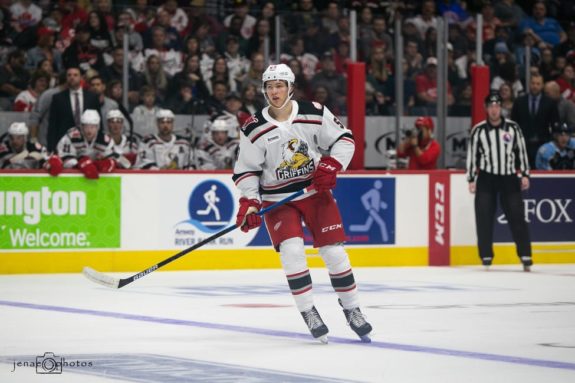
The defence is a major concern outside of Seider, who is going to have to log massive minutes in all situations and play otherworldly to give Germany a chance of reaching the quarterfinals. Alexander Dersch is another former CHL import (QMJHL Charlottetown), but he is the only other recognizable name on defence following the strange cuts of Glotzl and Simon Gnyp, who surely would have helped from a puck-moving standpoint.
Hane is going to be under siege in every game and he’ll need to stand tall despite being undersized by today’s goaltending standards — listed at 5-foot-10 and 163 pounds.
Even if Germany doesn’t win a game in the preliminary round, they should be able to avoid relegation by beating Kazakhstan from the other group. It would have been interesting to see Germany in that group, with the possibility of finishing as high as third there behind Finland and Sweden but ahead of Kazakhstan, Slovakia and maybe even Switzerland. On paper, a case can be made for Germany having the third-best roster among that group.
Frontloaded Schedule
This year’s tournament starts with a bang on Boxing Day as Canada clashes with the United States and Sweden takes on Finland in rivalry openers. It’s just too bad those games are taking place at the exact same time!
The bookies have those four countries finishing 1-2 in their respective groups, so it promises to be a real measuring stick on opening day. There will be no easing into this tournament — as has been the case in a lot of years — and every team will need to hit the ground running.
Canada’s schedule is frontloaded, facing the Americans today, then Russia on Saturday, Germany on Monday and, lastly, the host Czechs on New Year’s Eve (Tuesday). That will feel a bit odd, with the NYE game typically against a fellow power nation — often the United States or Russia. But it makes sense that the hosts get that showcase matchup this time around.
Medal Predictions
Alas, it is prediction time — and time to answer these pressing questions.
Can Sweden continue their round-robin dominance and carry that momentum into the medal round?
Can Canada end their medal drought in Europe and rebound from a sixth-place showing on home ice last year?
Can the United States come out on top after coming up one goal short in settling for silver at Vancouver?
Can Finland repeat? Can Russia rise to the podium? Can the Czechs make the most of hosting?
Can any of the also-rans exceed expectations like Switzerland did in finishing fourth last year?
For the record, Sweden has won 48 consecutive round-robin contests dating back to 2006 — but only has one gold medal to show for their efforts over that 13-year run.
Canada has failed to medal in each of the last three tournaments held overseas, including bronze-medal losses in 2013 and 2014. The last time Canada captured gold in Europe was in 2008 — ironically in the Czech Republic. That was in the midst of winning five straight titles from 2005 to 2009.
No country has repeated as champion since then and five different nations have won gold over the last 10 years. Finland and the United States, which combined for three championships in the event’s first 32 years of existence, have three golds apiece in the last 10 years.
Stick-tap to Matt Teague of The Score for much of that research, also noting that Canada will exit a decade with fewer than four gold medals for the first time regardless of their result in 2020.
I do like Canada’s chances of medalling under the Hunter brothers — head coach Dale and manager Mark, the architects of this OHL-laden roster. Canada’s fate — and the colour of Canada’s medal — will come down to goaltending, which is the least proven position on this roster. It’s not necessarily a weakness, but it’s not a strength in comparison to the competition. I’m not confident in the goaltending, which is why I’m predicting a bronze-medal finish for Canada.
I’m predicting the United States to win gold, with Russia getting silver, while Canada defeats Finland for bronze.
For those predictions to come to fruition, the tournament would play out as follows:
Preliminary Round Standings
Group A
Finland
Sweden
Switzerland
Slovakia
Kazakhstan
Group B
United States
Russia
Canada
Czech Republic
Germany
Playoff Round
Quarterfinals
Finland over Czech Republic
Russia over Switzerland
United States over Slovakia
Canada over Sweden
Semifinals
Russia over Finland
United States over Canada
Gold Medal Game
United States over Russia
Bronze Medal Game
Canada over Finland
Relegation Round
Germany over Kazakhstan
Well, what do you think of my predictions? How do you foresee this year’s tournament playing out? Which countries do you have winning medals?